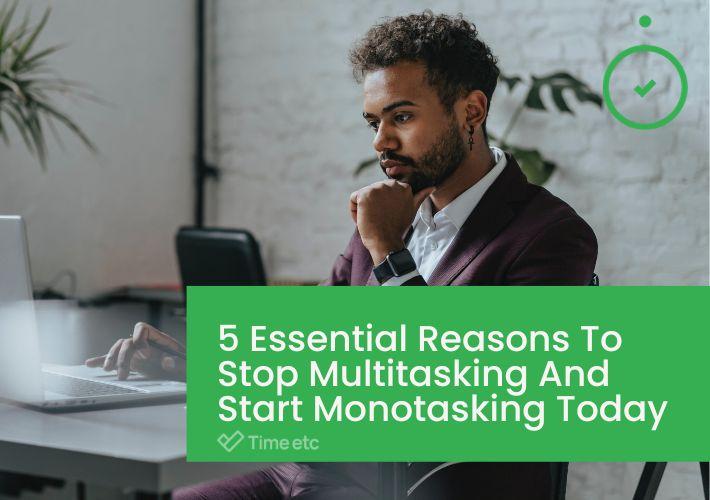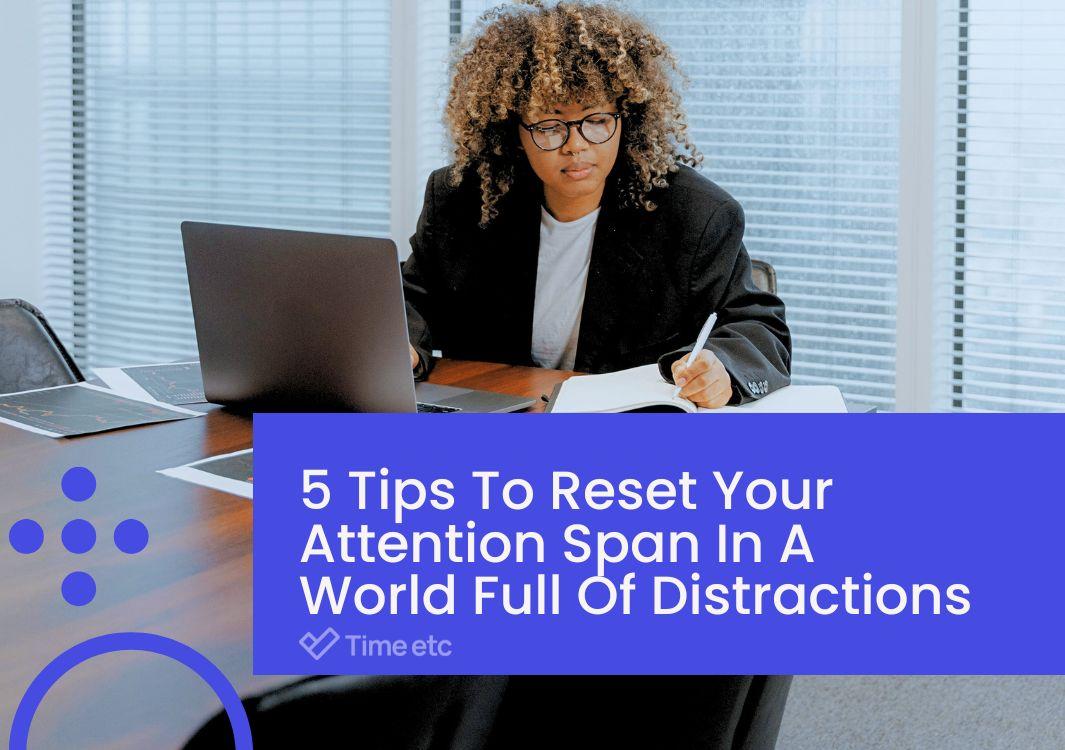For many small business owners, getting everything done can be a huge challenge. With so many different responsibilities pulling you in a million different directions, it can feel like there simply aren’t enough hours in the day to accomplish it all.
It's no wonder 84% of small business owners spend over 40 hours at work each week, and 33% report spending over 60 hours each week working on their business. But despite racking up all these extra hours at work (between 16%-74% more than the average person), it can still be difficult to tick off everything that needs to be done.
That's why many entrepreneurs default to multitasking. In theory, it seems like a no-brainer, but in reality, multitasking can pave the way for significantly more problems than it appears to solve.
Experts agree that monotasking, or single-tasking, is a much more effective way to tackle your to-do list and can help you become more productive and focused.
What Is Multitasking?
Multitasking is a term used to describe doing two or more tasks simultaneously, like taking phone calls while writing a report, or scrolling through social media while watching a show on TV, for example. This approach can make the work seem faster or easier, but it comes with many drawbacks.
Why stop multitasking and embrace monotasking?
In the fast-paced world of business, the ability to take on multiple tasks simultaneously and do twice as much work in a fraction of the time seems like a worthy skill to cultivate. And perhaps it would be, that is, if it were actually possible.
The truth is, multitasking is a myth.
We're not actually doing more than one thing at a time. We're rapidly switching from one task to another, repeatedly.
And even if you think you're a multitasking master, the findings from recent research would beg to differ. According to researchers at the University of Utah, those who believe they can multitask well are not good at it in reality. Another study found that only 2.5% of people may be able to do it effectively.
On the other hand, monotasking—or single-tasking—is the practice of focusing on one particular task at a time. Instead of switching back and forth, monotasking involves completing each task individually until it’s done.
So if you frequently juggle multiple work tasks on any given day, here are seven reasons why you should start monotasking today.
1. Multitasking reduces productivity
One of the main reasons small business owners opt to multitask is because they think it will help them work faster and more efficiently. But in reality, research shows that the opposite is true—especially for anything more complicated or less familiar than what we're used to.
Every time we switch tasks, our brains have to "shift mental gears" to work on the new task. According to researchers, these brief mental blocks created by task-switching can cost up to 40% of your productive time.
Monotasking eliminates these mental blocks and allows you to give the full force of your undisturbed attention to getting the task done.
2. Multitasking affects the quality of work
It's not just the amount of work we're able to complete that takes a hit when multitasking—the quality of the work can suffer as well.
Multitasking during cognitive tasks can reduce IQ by up to 15 points, which is the same as if you were running on zero hours of sleep the night before. This not only makes it more difficult for you to concentrate but also increases the chances that you'll miss important details or make mistakes.
Devoting your full attention to a single task helps you focus and be more thorough in your work. You can do a better job of picking up on details that may have been missed if you had tried to multitask.
3. Multitasking can lead to burnout
An estimated 53% of business managers report experiencing workplace burnout. While the causes of workplace burnout can vary from person to person, many factors can ultimately be traced back to multitasking.
This is because, no matter how good we think we are at multitasking, trying to do multiple tasks at once triggers stress responses in our bodies. And it's no secret that stress can wreak havoc on our mental performance.
According to neuroscientists, our highest cognitive abilities—such as reasoning, problem-solving, comprehension, impulse control, creativity, and perseverance—are borne out of the most highly evolved region of our brain, the prefrontal cortex. However, this region is also the most sensitive to the effects of stress exposure. When increased levels of dopamine, noradrenaline, and other neurotransmitters are released as part of a stress response, this weakens the prefrontal cortex and impairs our cognitive abilities.
When the quality of our work is impacted or we're unable to complete work on time due to our brains operating at less-than-peak performance, this can cause stress to increase further, creating a vicious cycle.
Not only that, the prefrontal cortex relies on oxygenated glucose as fuel to function effectively and stay on track. Every time we start a new task, more fuel is required. Constant task-switching causes the brain to burn through its fuel reserves so quickly, we're left feeling mentally drained and exhausted even after a short time working.
This combination of prolonged stress and mental exhaustion is a steep, slippery slope that leads to burnout.
4. Multitasking affects decision-making
The impact of multitasking on the prefrontal cortex can also be found in our decision-making skills.
Research shows that those who multitask frequently have trouble focusing on what is important and find it difficult to ignore irrelevant information and external interruptions to their environment—even when they are not multitasking.
In another experiment, participants were given 30 minutes to write an analytical essay. On the side of their computer screen, snippets of information appeared. Half were shown information that was related to the topic of the essay, and the other half were shown irrelevant information. The results found that participants who frequently multitasked were unable to filter out the irrelevant information they saw on their screens, and wrote essays that were graded "inferior".
With monotasking, fewer demands on your cognitive resources mean that you can give each decision in your business the focus and attention it deserves.
See: How To Make Better Decisions As An Entrepreneur
5. Monotasking is best for memory
Another major downside to multitasking is that it can seriously affect memory.
When you are concentrating on one thing at a time, your short-term, long-term, and working memory are engaged to bring up any previous experience, education, and knowledge needed to complete the task at hand. When you switch to a new task, the entire process must start anew. This, again, causes mental blocks, leading to more mistakes made and slower completion times.
Studies have also shown that multitasking while learning causes information to be stored in the wrong part of the brain, making it harder to recall when you need it later. Researchers at Stanford University found that when participants were asked to learn a simple classification task while performing another simple task simultaneously, the information went into the striatum—a region specialized for storing new habits and skills, such as learning to ride a bicycle—instead of the hippocampus, where facts and ideas are usually stored.
How to become better at monotasking
Now that you know the essential reasons why you should start monotasking today, it’s time to discuss how to go about doing so. Here are some tips on how to strengthen your monotasking muscle.
List your priorities for the day
Starting each day with a long to-do list full of competing priorities makes us much more likely to try and multitask in an attempt to get it all done. But as we now know, this won't give us the results we need.
Instead, narrow it down to what is urgent and important in your business. This will help make sure you don't miss any deadlines or lose sight of your goals; and will give you a clear objective to center your workload around.
Batch your tasks around your priorities
Group all similar tasks together and work through each group in turn to keep task-switching to a minimum.
Staying on track and working efficiently is much easier when you're not needlessly wasting your brain's fuel supplies going to and from different tasks and the different thought processes required for each.
Identify your peak performance hours
Everyone has a specific time of day when they are sharpest, most efficient, and less easily distracted.
The key to maximizing your monotasking success is to recognize when that window of maximum potential opens up for you. Whether you do your best work early in the morning or come alive late afternoon, take some time to observe yourself and understand your own personal patterns of productivity.
Schedule time in your calendar for deep work
Once you know what your peak performance window is, make sure you guard it well. This period of time is when monotasking will be easiest for you, so it's crucial that you make the most of it.
Block out time in your calendar for deep work sessions dedicated to your priority tasks. Doing so will also help keep you accountable, and giving yourself a set time each day means that your important tasks are less likely to fall through the cracks.
Eliminate distractions
When you’re working on a task, aim to keep your workspace as distraction-free as possible. This might include minimizing noise and setting boundaries around your availability so you're not disrupted by colleagues (or family members if you work from home).
There are also many apps and programs available that allow you to block distracting websites while working on specific tasks. These programs can help keep you focused on one task at a time by blocking out any potential distractions that could pull your attention away from what needs to be done first.
Hire VAs to manage your workload
One of the most effective ways to reduce the need to multitask in the first place is to offload the low-value, distracting tasks that take time and energy away from our most important work. Delegating or outsourcing these tasks allows us to focus on the things that matter most, reduce stress, and get more done in less time.
Virtual assistants (VAs) are independent professionals who provide administrative or executive support to their clients from remote locations. Anything that's tedious or time-consuming—from scheduling meetings and maintaining the minutes to creating marketing materials and managing your inbox—you’re bound to find a skilled VA who can take it off your hands.
And since virtual assistants are not full-time employees of your company, they provide great savings compared to hiring full-time staff. You only pay for the productive time they spend working on tasks for you, so no need to worry about squeezing more full-time salaries, benefits, office supplies, or equipment into your company budget.
What's the bottom line?
Multitasking is one of the greatest myths of the modern world, and one of the biggest enemies of efficiency, effectiveness, and even well-being.
In this age of distraction and information overload, monotasking is becoming one of the most important skills to develop. Although multitasking may seem impressive, it could be having a devastating effect on your productivity.
If you want to reclaim control of even more time and energy to focus on your most meaningful work, Time etc is here for you. Our mission is to help you do more, achieve more, and earn more by matching you with the best virtual assistants for your needs. We have a wide range of experienced assistants to tackle those tedious and time-consuming tasks that are holding you back, so you can leave multitasking firmly in the past.
Speak to our expert team to get started. We’ll set you up with a dedicated professional based on your unique requirements.
Or try a skilled virtual assistant for free today!







